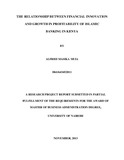| dc.description.abstract | The objective of this research study was to assess the relationship between financial innovation in Shariah compliant financial products and services and profitability of Islamic banking in Kenya. This study targeted eight (8) commercial banks that operate Islamic banking in Kenya. It covered the period between 2009 and 2012. Specifically, the study sought to establish the relationship between Islamic financial innovations and banking profitability. The return on Assets (ROA) was used to measure profitability and was calculated by dividing the banks’ net profit before taxation by the total assets held by the bank over the study period. Financial innovation was measured by; Number of Islamic debit and credit cards issued by Islamic banks, Contribution of agency banking, internet banking and mobile banking to income generated from Islamic banking, Number of new Shariah compliant financing facilities, Maintenance cost of Islamic debit and credit cards and Margin generated from Islamic debit and credit cards. The data for this study was collected using questionnaires for primary data study and secondary data was obtained from the Central Bank of Kenya annual reports. Out of the eight banks targeted, six responded which represented a response rate of 75%. A regression analysis on each of the Islamic banking innovations above individually against the bank’s profitability (ROA) revealed that there is a very weak relationship between individual innovations and profitability. The study results showed that bank innovations have a moderate influence on profitability of Islamic banks in Kenya. The analysis on combined effect of bank innovations produced a coefficient of determination of 56.8% which shows the percentage of variations in profitability which is explained by bank innovations. Based on the summary of the findings the study concluded that if Islamic banking is to have meaningful contribution to profits such banks should adopt a composite of financial innovations. Given that the relationship of the model is positive, increasing financial innovations would affect a bank’s profitability positively. Similarly, a decline in financial innovations would decrease a bank’s profitability. The moderate relationship (moderate correlation) between financial innovations and profitability implies that there are more other factors which affect a bank’s profitability and not only financial innovations. The study recommended that banks offering Shariah compliant financial services should focus their efforts on financial innovations. The more the financial innovations a bank is able to adopt, the more its chances of enhancing its profitability. | en |

